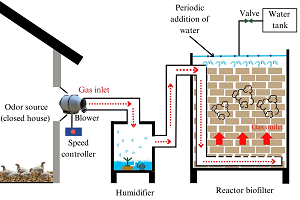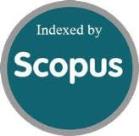Closed-House Biofilter Design and Performance Evaluation for Mitigating Environmental Odor Disturbances
DOI:
https://doi.org/10.46604/ijeti.2023.12851Keywords:
biofilter, closed house, hedonic scale, odor gas concentration, reduction efficiencyAbstract
Broiler-closed houses typically lack reduction technology, leading to environmental issues, namely odor. Processing technology can be used, namely biofilters. This study aims to design and construct a closed-house biofilter and perform a test on the biofilter to reduce odors. Odors are measured by the odor gas concentration (ammonia and hydrogen sulfide) and hedonic scale by the panel method. The biofilter consisted of an odor source (closed house), a humidifier, and a biofilter reactor. Factors that influence the size of the biofilter reactor from gas removal activities include air flow rate, retention time, and air volume. The proposed biofilter can reduce the odor from the broiler. Reactor temperature, relative humidity, and bacterial activity affect odor reduction. This successful implementation of a biofilter significantly mitigates odors in a closed-house broiler, addressing a critical environmental concern.
References
Y. Zhang, X. Ning, Y. Li, J. Wang, H. Cui, J. Meng, et al., “Impact Assessment of Odor Nuisance, Health Risk and Variation Originating from the Landfill Surface,” Waste Management, vol. 126, pp. 771-780, May 2021.
Peraturan Pemerintah Republik Indonesia Nomor 22 Tahun 2021, PP no. 22, 2021. (In Indonesia)
Keputusan Menteri Negara Lingkungan Hidup Nomor 50 Tahun 1996 Tentang Baku Tingkat Kebauan. (In Indonesia)
A. S. Yuwono, “Kuantifikasi Bau Dan Polusi Bau Di Indonesia,” Jurnal Purifikasi, vol. 9, no. 2, pp. 175-186, 2008. (In Indonesia)
B. Wang, X. Li, D. Chen, X. Weng, and Z. Chang, “Development of an Electronic Nose to Characterize Water Quality Parameters and Odor Concentration of Wastewater Emitted from Different Phases in a Wastewater Treatment Plant,” Water Research, vol. 235, article no. 119878, May 2023.
T. Zheng, L. Li, F. Chai, and Y. Wang, “Factors Impacting the Performance and Microbial Populations of Three Biofilters for Co-Treatment of H2S and NH3 in a Domestic Waste Landfill Site,” Process Safety and Environmental Protection, vol. 149, pp. 410-421, May 2021.
A. M. Damuchali and H. Guo, “Evaluation of Odour Properties, Their Relationships, and Impact of an Oil Refinery Plant on the Surrounding Environment Using Field Measurements,” Atmospheric Environment, vol. 230, article no. 117480, June 2020.
G. Zheng, Y. Cheng, Y. Zhu, J. Yang, L. Wang, and T. Chen, “Correlation of Microbial Dynamics to Odor Production and Emission in Full-Scale Sewage Sludge Composting,” Bioresource Technology, vol. 360, article no. 127597, September 2022.
B. Gandu, S. Palanivel, S. Juntupally, V. Arelli, S. Begum, and G. R. Anupoju, “Removal of NH3 and H2S from Odor Causing Tannery Emissions Using Biological Filters: Impact of Operational Strategy on the Performance of a Pilot-Scale Bio-Filter,” Journal of Environmental Science and Health, Part A, vol. 56, no. 6, pp. 625-634, 2021.
T. Cao, Y. Zheng, and H. Dong, “Control of Odor Emissions from Livestock Farms: A Review,” Environmental Research, vol. 225, article no. 115545, May 2023.
Broiler Meat Production by Province (Tons), 2020-2022.
S. Maruthai Pillai, G. Parcsi, X. Wang, and R. Stuetz, “Odour Abatement of Poultry Litter Using Odour Control Products,” Chemical Engineering Transactions, vol. 30, pp. 247-252, September 2012.
C. Conti, M. Guarino, and J. Bacenetti, “Measurements Techniques and Models to Assess Odor Annoyance: A Review,” Environment International, vol. 134, article no. 105261, January 2020.
Y. C. Wang, M. F. Han, T. P. Jia, X. R. Hu, H. Q. Zhu, Z. Tong, et al., “Emissions, Measurement, and Control of Odor in Livestock Farms: A Review,” Science of The Total Environment, vol. 776, article no. 145735, July 2021.
R. Lebrero, R. Muñoz, S. Villaverde, and Y. T. Hung, “Air Biofiltration Applied to Odor Treatment,”, Handbook of Environment and Waste Management: Air and Water Pollution Control, vol. 1, pp. 149-174, 2012.
A. R. Virginia, A. S. Yuwono, and C. Arif, “Environmental Odor Analysis in West and East Java’s Ambient Air and Odor Reduction Using Biofilter Model,” Emerging Science Innovation, vol. 2, pp. 09-18, January 2024.
P. Márquez, A. M. Herruzo-Ruiz, J. A. Siles, J. Alhama, C. Michán, and M. A. Martín, “Influence of Packing Material on the Biofiltration of Butyric Acid: A Comparative Study from a Physico-Chemical, Olfactometric and Microbiological Perspective,” Journal of Environmental Management, vol. 294, article no. 113044, September 2021.
Udara Ambien – Bagian 1: Cara Uji Kadar Amoniak (NH3) Dengan Metoda Indofenol Menggunakan Spektrofotometer, SNI 19-7119.1-2005, 2005. (In Indonesia)
J. P. Lodge, Methods of Air Sampling and Analysis, 3rd ed., Washington: Lewis Publishers INC, 1988.
B. R. F. Nogueira, N. K. Sakomura, B. B. Leme, M. de Paula Reis, J. B. K. Fernandes, and G. da Silva Viana, “Lysine and Arginine Requirements of Male and Female Broiler in the Starter, Grower, and Finisher Phase,” Animal Feed Science and Technology, vol. 283, article no. 115174, January 2022.
V. Brandejs, L. Kupcikova, Z. Tvrdon, D. Hampel, and M. Lichovnikova, “Broiler Chicken Production Using Dietary Crude Protein Reduction Strategy and Free Amino Acid Supplementation,” Livestock Science, vol. 258, article no. 104879, April 2022.
M. Hejdysz, J. Bogucka, E. Ziółkowska, K. Perz, Ł. Jarosz, A. Ciszewski, et al., “Effects of Low Crude Protein Content and Glycine Supplementation on Broiler Chicken Performance, Carcass Traits, and Litter Quality,” Livestock Science, vol. 261, article no. 104930, July 2022.
Y. Xu, W. Liang, and Y. Hu, “Methodological Assessment of Screening Methods and Minimum Panel Member Requirements for Odor Assessments,” Building and Environment, vol. 237, article no. 110326, June 2023.
Broiler Management Guide, Cobb-Vantress, 2018.
A. Rolewicz-Kalińska, K. Lelicińska-Serafin, and P. Manczarski, “Volatile Organic Compounds, Ammonia and Hydrogen Sulphide Removal Using a Two-Stage Membrane Biofiltration Process,” Chemical Engineering Research and Design, vol. 165, pp. 69-80, January 2021.
I. Omri, F. Aouidi, H. Bouallagui, J. J. Godon, and M. Hamdi, “Performance Study of Biofilter Developed to Treat H2S from Wastewater Odour,” Saudi Journal of Biological Sciences, vol. 20, no. 2, pp. 169-176, April 2013.
S. C. Schaefer and J. T. Hollibaugh, “Temperature Decouples Ammonium and Nitrite Oxidation in Coastal Waters,” Environmental Science & Technology, vol. 51, no. 6, pp. 3157-3164, March 2017.
M. Galwa-Widera, A. Kwarciak-Kozłowska, and J. Bień, “Reduction of Odour Nuisance of Industrial Plants–Biofiltering in Composting Plants,” Journal of Ecological Engineering, vol. 19, no. 5, pp. 135-143, 2018.
C. Hawko, M. Verriele, N. Hucher, S. Crunaire, C. Leger, N. Locoge, et al., “A Review of Environmental Odor Quantification and Qualification Methods: The Question of Objectivity in Sensory Analysis,” Science of the Total Environment, vol. 795, article no. 148862, November 2021.

Published
How to Cite
Issue
Section
License
Copyright (c) 2024 Adinda Rizki Virginia, Arief Sabdo Yuwono, Chusnul Arif

This work is licensed under a Creative Commons Attribution-NonCommercial 4.0 International License.
Copyright Notice
Submission of a manuscript implies: that the work described has not been published before that it is not under consideration for publication elsewhere; that if and when the manuscript is accepted for publication. Authors can retain copyright in their articles with no restrictions. Also, author can post the final, peer-reviewed manuscript version (postprint) to any repository or website.

Since Jan. 01, 2019, IJETI will publish new articles with Creative Commons Attribution Non-Commercial License, under Creative Commons Attribution Non-Commercial 4.0 International (CC BY-NC 4.0) License.
The Creative Commons Attribution Non-Commercial (CC-BY-NC) License permits use, distribution and reproduction in any medium, provided the original work is properly cited and is not used for commercial purposes.







.jpg)


